May 22, 2025 | 14:43 GMT +7
May 22, 2025 | 14:43 GMT +7
Hotline: 0913.378.918
May 22, 2025 | 14:43 GMT +7
Hotline: 0913.378.918
The hobby of raising Koi fish as an ornamental has become popular among Hai Phong citizens in recent years. However, the production is unstable due to spontaneous development, limited scale, and unequal experience among raisers.
Therefore, Hai Phong Agricultural Extension Center has coordinated with the Sub-Departments of Fisheries and Departments of Agriculture and Rural Development in localities to find solutions for the development and consumption of Koi Fish, particularly in An Lao District.
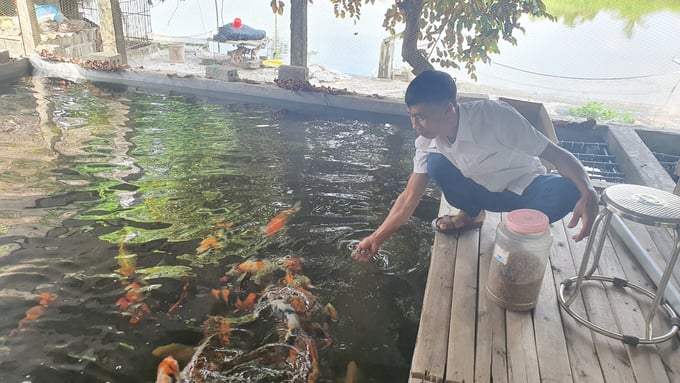
Koi fish farming is being developed in Hai Phong. Photo: Dinh Muoi.
According to the Department of Agriculture and Rural Development of An Lao District, this locality currently has an aquaculture area of 798ha, of which 140ha is outside the dyke, mainly for exploiting mollusks (accounting for 17% of the area), and 16.5ha for ornamental fish farming (accounting for 2% of the area).
Commercial fish is mainly supplied to the market in the district, and ornamental fish is supplied in the whole city and some neighboring provinces and cities such as Hanoi and Hung Yen through several traders.
Thanks to the timely attention and support of local authorities, the aquaculture of a variety of ornamental fish has thrived in Hai Phong City, achieving positive results. Specifically, the city has 40 households specializing in raising Koi fish on a total area of 16.5ha, concentrated in Chien Thang, My Duc, An Thang, Quang Trung Communes (An Lao District). Koi fish farming brings a profit of 3-4 times higher than other kinds of fish.
Vu Van Tang, a local in My Duc Commune (An Lao District) has 1.6 ha of aquaculture. After being discharged from the army, he learned to raise Koi fish himself. After 2 consecutive failures, he has now become a well-off farmer.
Compared with Japanese Koi fish, Vietnamese-bred species are easy to raise, have fewer diseases and could live in an environment similar to commercial fish. Sold from VND250 to 300,000/kg, it could bring high profit to raisers.
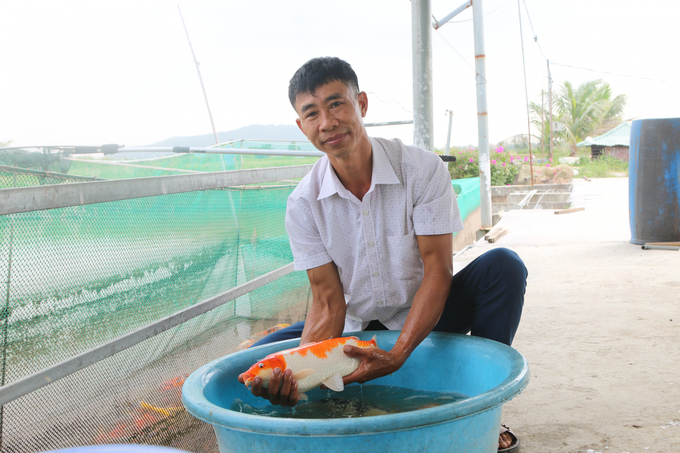
Vu Van Tang earns an annual income of billions of VND from Koi fish farming. Photo: Dinh Muoi.
Raising Vietnamese-bred Koi fish does not take too much time, especially with the support of modern technologies in caring and feeding processes. Starting from an initial investment of VND60,000 VND/kg, fish farmers can profit from raising Koi fish much higher than other kinds of commercial fish.
“The price of food for Koi fish is often high. It could not be sold in buckets all at once so the purchase volume is not much. It has to be sold sporadically throughout the year, but the economic value is undisputed. In general, the profit is huge,” said Tang.
According to Tang, the current market for Koi fish is large, but there are not many purebred breeds left. Farmers need to find purebred varieties that have good breeding to improve their value. Therefore, his family is completing documents to ask for local authorities’ approval of turning his farm into a hatchery, and at the same time, purchasing Japanese Koi fish to create pure, beautiful breeds. After completing the trademark registration, he intends to have his fish exported, firstly to Southeast Asian countries.
“Raising Koi fish is not difficult and very profitable. The market in the next 5 years will still be large, so I hope the authorities will pay more attention and have a strategy to help us create a brand of Vietnamese-bred Koi fish for export," he added.
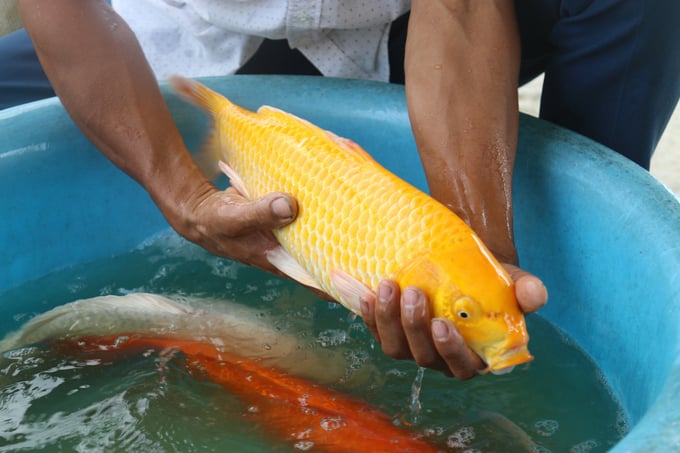
Koi fish is easy to raise and could bring high profits. Photo: Dinh Muoi.
Besides An Lao, many other households in Hai Phong have also been converting inefficient aquaculture areas to Koi fish farming and all have earned "skyrocketing" incomes. However, at present, aquaculture development in the city in general still faces some difficulties such as a limited and uneven understanding of aquaculture techniques, especially in disease prevention.
The hobby of keeping Koi fish for ornamental and for feng shui purposes is not only popular in Japan but also in most countries around the world, including Vietnam. The fish species not only has an eye-catching color but is also famous for its high value, bringing economic efficiency to the farmers, therefore, Koi fish farming needs to be studied and replicated methodically.
“The prices of Koi fish are varied, depending on the size or color. The lowest sold type is VND150,000/kg for Vietnamese-bred fish. Those imported directly from Japan have high prices due to their large size. They could reach up to 1m long, weigh tens of kilos and have beautiful and clear colors. Their price is VND20 - 30 million/ each, some is even priced at VND50 million,” said Vu Van Quan, a Koi fish raiser in Ky Son Village, Tan Trao Commune (Kien Thuy, Hai Phong).
Translated by Phuong Ha
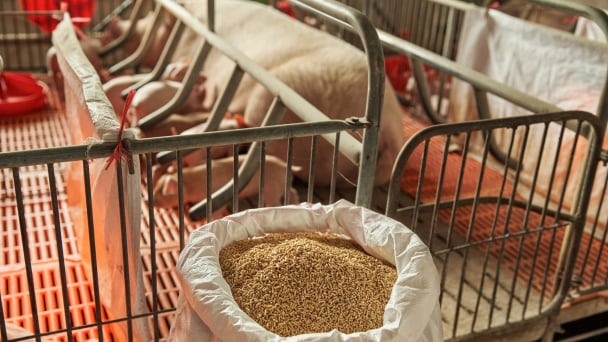
(VAN) CJ Feed&Care officially launched the FCR improvement campaign called “2025 Find Challenge Reach” in April 2025. In Vietnam, this campaign is implemented by CJ Vina Agri.
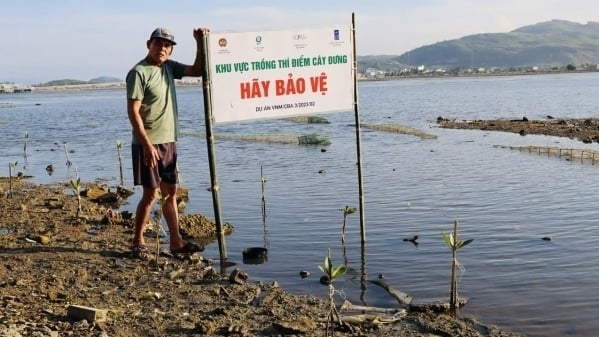
(VAN) The swamp in Pho Thanh is gradually being covered with red mangrove, creating a favorable environment for producing clean, high-quality salt.
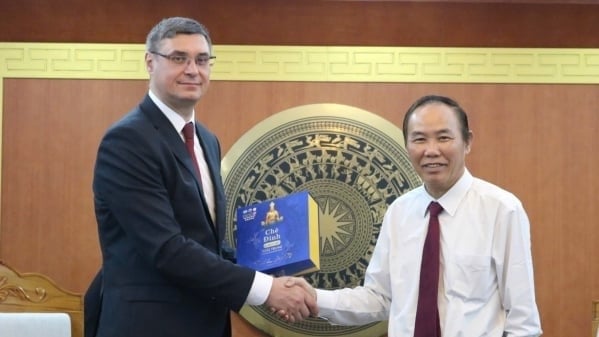
(VAN) The trade turnover of agro-forestry-fishery products is growing significantly, along with investment cooperation commitments that are opening up new development directions between Vietnam and Russia.

(VAN) Khanh Hoa is investing over 545 billion VND to develop 240 hectares of high-tech marine aquaculture in order to guarantee a consistent supply of seafood exports and achieve the USD 1 billion target.

(VAN) Minister of Agriculture and Environment Do Duc Duy held a meeting with Soopakij Chearavanont, Chairman of C.P. Group, on May 15.
/2025/05/16/3800-0-nongnghiep-143756.jpg)
(VAN) Suntory PepsiCo Vietnam coordinated with the Ministry of Education and Training to implement an education program on water conservation, reaching nearly 1 million primary school students nationwide.

(VAN) Vietnam’s TH Group officially put its high-tech fresh milk processing plant into operation in the Russian Federation, marking a historic moment as the first TH true MILK cartons were produced in Russia.